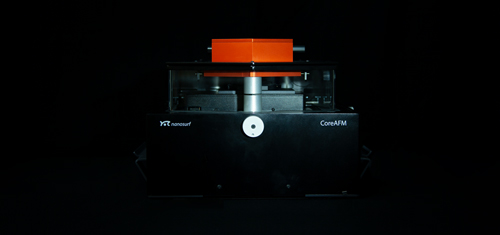Atomic force microscope prices
The answer to the question how much an atomic force microscope (AFM) costs is always "it depends". The pricing of scanning probe microscopes is influenced by many factors, like the performance, capabilities and modes you expect from your instrument, which in turn determine the components and complexity of the technology employed.
The following aspects have the largest impact on the AFM’s price:
- Type of scanner: tip scanner or sample scanner
- Sample size and weight
- Scan range: are large scan ranges required?
- Lateral resolution: is, for example, atomic resolution needed?
- Vertical resolution and noise level: are measurements of surfaces with sub-Angstrom roughness planned?
- Low noise levels of the deflection signal, e.g. for sensitive force spectroscopy
- Controller performance
- Elaborate accessories, e.g. temperature or environmental control, combination with optical microscopy, FluidFM, or variable magnetic field
- Special measurement modes
- Automation of measurements and sample handling
While it is possible to purchase a simple AFM for as little as a few thousand US dollars, top of the range high-end models can cost half a million dollars or more.
The most important thing when considering which AFM to buy is to first determine your requirements. Which questions does your research set out to answer and what is needed to do this? It can be difficult to answer this, and assistance from experts in the field, e.g. colleagues, technical sales staff or application specialists, can be of great help here. Your AFM provider should be able to offer assistance though their technical sales reps or application scientists.
Once you have found the answers to these initial questions, the instruments and options that match your research needs need to be inventoried. Such an overview of possible buying options is very helpful, or may even be required, when you apply for funding. If your funding possibilities are not able to meet the research needs, you might want to consider a second-hand instrument, as discussed further below.
We are aware that we operate in a competitive market and it is your due diligence to compare offers by different AFM providers. The Nanosurf sales team will happily provide you with a budgetary quotation after initial discussions about your requirements. This will provide you with all the information you need in order to apply for a grant or funding, when submitting your project proposal.
It is also important to consider additional aspects when evaluating your options, for instance after sales support, conditions of warranty, user training, and the AFM’s flexibility regarding later upgrades and adapting to new research requirements.
Nanosurf's wide range of atomic force microscopes
Nanosurf offers a broad portfolio of instruments, covering all types of requirements, from entry-level affordable compact AFMs up to advanced research instruments for materials science and AFMs for biological or life science applications. Industrial facilities often have very specific requirements – for these cases Nanosurf can develop fully customized systems, e.g. for very large or extraordinarily heavy samples. Contact us to discuss your application, and our PhD-level AFM experts in sales and support will help you determine which instrument best meets your requirements, which modes and options you should consider, and the amount of funding you will need to apply for.
While many AFM providers advertise part of their product portfolio as "low cost" instruments, please be aware that these are often still priced significantly higher than Nanosurf's entry-level AFMs. Even if you are operating on a tight budget, our compact NaioAFM provides solid performance and is even suitable for basic research. Furthermore, over the past years, the CoreAFM has become increasingly popular with researchers ranging from entry-level users to experienced scientists, and it's price is very attractive for a limited budget.










